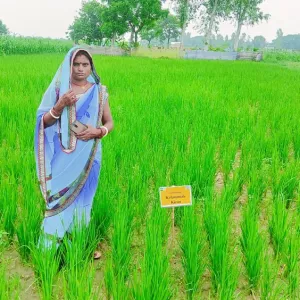Promoting sustainable agriculture and empowering small-scale farmers through quality seeds and training
IRRI continually explores various seed system models to benefit small community organizations led by farmers. In recent years, particular emphasis has been placed on community-led seed networks, especially those managed by women’s organizations. (Photo: IRRI India) Uttar Pradesh, the most populous state in India, heavily relies on rice as a staple food, making rice farming a crucial economic activity for

Promoting sustainable agriculture and empowering small-scale farmers through quality seeds and training
IRRI continually explores various seed system models to benefit small community organizations led by farmers. In recent years, particular emphasis has been placed on community-led seed networks, especially those managed by women’s organizations. (Photo: IRRI India)
Uttar Pradesh, the most populous state in India, heavily relies on rice as a staple food, making rice farming a crucial economic activity for millions of farmers. However, rice production in the state is not very productive and profitable. The main hindrances among the diverse rice-growing environments in the state include the slow introduction of new rice varieties and a fragile system for providing quality seeds of high-yielding and climate-resilient rice varieties.
Uttar Pradesh, the most populous state in India, heavily relies on rice as a staple food, making rice farming a crucial economic activity for millions of farmers. However, rice production in the state is not very productive and profitable. The reasons behind this issue are varied and complicated.
The main hindrances among the diverse rice-growing environments in Uttar Pradesh include the slow introduction of new rice varieties and a fragile system for providing quality seeds of high-yielding and climate-resilient rice varieties.
Despite numerous new rice varieties, farmers cultivate predominantly older ones like Swarna, Samba Mahsuri (BPT-5204), and Sarju-52.
According to the 2020 Production Oriented Survey by the Indian Council of Agricultural Research (ICAR), Swarna and Samba Mahsuri cover 31% and 25% of the rice cultivation areas, respectively. Both varieties have been around for almost 40 years.

